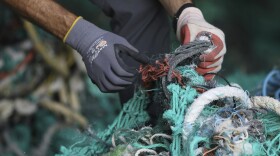COVID-19 vaccinations officially started Wednesday at Queen’s Medical Center. However, five frontline workers were vaccinated on Tuesday-- making them the first in the state to receive the doses.
“I'm confident in the science,” said Dr. Lester Morehead. He was the first person in the state to take the Pfizer COVID-19 vaccine.
“I believe in it. We need to end this and this is the best way we can do it,” he said.
Along with four other frontline workers at Queen’s, Morehead took the vaccine ahead of the official roll out.
Each shot took about a minute and everyone immediately returned to work.
Moorehead thought it felt like any other shot.
“I'm honored,” he said. “I want others to get it too.”
The Pfizer vaccine requires two doses. That means in 21 days, these workers will need to receive a second shot.
Queen’s President Dr. Jason Chang said the hospital has 975 doses of the vaccine, but expects to get more.
“We expect that shipments will come weekly. We're still working with the Department of Health on how many we're going to get,” he said.
“We do believe that our second order is about 5000.”
The state expected to receive 45,000 doses of the Pfizer vaccine this month. It estimated that it will also get 36,000 doses of the Moderna vaccine if the federal Food and Drug Administration grants it an emergency use authorization.
Chang noted that it was important for those who receive the vaccine to watch for any side effects which they should report to the FDA.
“From all indications the first injection has very few side effects,” he said.
“And so the anticipation is that people will be able to go about their day, but definitely monitor their symptoms.”
Queen’s has four freezers that can hold the vaccines at negative 94 degrees fahrenheit.
Nurse Deborah Lichota works in the COVID-19 unit and was the second person in the state to receive the vaccine. She said the past few months have been exhausting.
We as nurses want to save and protect lives. And there have been times where we're at our patient's bedside, holding their hands, when it should be their families and loved ones with them,” she said.
“We've seen the detrimental outcomes of what this disease does. We've seen people who were once very strong, become just a fraction of the person that they were, and we need to get a hold of this. This doesn't mean that once you get the vaccine, you don't have to wear your mask, and you don't have to wash your hands, it's still needing that. But we need to do something to help prevent the spread of this.”
Healthcare workers and residents at long-term care facilities will be first to receive the vaccine.
Chang expected it would take two to three months to vaccinate all 8,000 Queen’s employees-- starting with those who work in the emergency room, the COVID-19 unit and the Intensive Care Unit.




